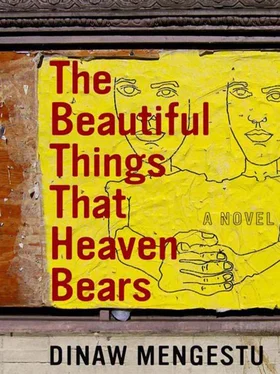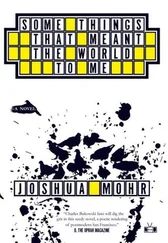I take a seat on the couch, slide off my shoes, and rest my tired feet on the coffee table. I’m not surprised to find that the springs have all held up, and that even the cushions are hardly any worse for wear. Preservation comes naturally to my uncle. It’s part of what made him so diligent and devoted a caretaker to me. When I came home from school or work in the evenings, I often found him sitting on the recliner facing the couch, mending a pair of my socks or removing the stains from one of the two white shirts I had to wear as part of my work uniform. He could have easily been someone’s grandmother with the way he rocked silently in that chair tending to the needs of his nephew. We barely spoke during the few hours we managed to share with each other every evening. Nothing more than a few tender kisses on the cheek followed by some generally insignificant statement about classes and work. He never tolerated any diversion into his own life. In the mornings he worked as a cabdriver and in the evenings he worked as a parking attendant at the Capitol Hotel. His life was determined by cars, tips, and making change. For a man who before coming to America had rarely ever driven his own car, the role reversal was always noted with his customary irony. “Perhaps,” he would say, “if I went back to Ethiopia I could get a job driving the general now living in my house. Although I would kill the both of us on our first trip out.” Any questions I may have had for him about his day or his fares were always met with a stern grin and a reminder that a man his age didn’t have to answer any questions from a man of mine. On particularly good days, though, he would come home grinning and when pressed for a reason, he would respond enthusiastically, “Gas is so cheap!”
His mouth stretches to the limits of his face whenever he repeats that line, and in his eyes you can still see remnants of the humorous, snobbish young man he had once been. He still drives his cab, but not as frequently. The car and the license to operate it are entirely his now. What he makes from his fares he splits into two: one half is tucked away into a silver lockbox, the other half is wired back to Ethiopia at the end of every month. There was never much money in this apartment. Between the two of us we made just enough to cover our bills and pay my school fees. Like anyone who is poor, we each learned to find some small pleasures wherever we could. In the summertime we slept on the floor with the balcony doors pulled wide open. We slept with one thin blanket and a small fan that blew down on us from the coffee table. I remember those nights as being the best nights of sleep I had in that apartment. They were dreamless nights, free of memories, and I was grateful for that. My uncle said once that he often thought of his time in Sudan when he lay sleeping on the floor next to me. “The only difference,” he said, “was that there were ten to fifteen of us sleeping on the floor together. We had pooled our money to pay for one room away from the refugee camp. The room wasn’t any bigger than this one. The floor was made of dirt and clay that kept it cool at night. I remember trying to lift my nose above the feet in front of me to smell the wind.” Before reaching Sudan, he had spent nearly a month walking through the countryside at night. He slept in the bush during the day and walked constantly through the evening. Half of the group of people he had met along the way perished somewhere in the desert, their bodies prayed over briefly before being left behind as carrion. He remembers those scorched summer nights spent pressed against the ground and someone’s feet as the best nights of sleep he has ever had.
The silver lockbox where he keeps his money hidden is in his bedroom closet behind a stack of cardboard boxes full of letters and newspaper clippings that he’s been saving for years. For as long as he has been living in the United States, he’s been writing letters to the government. Every cabinet secretary from education to the interior has received a letter, along with the National Security Agency, the Congressional Budget Office, the various speakers of the House along with the Senate minority and majority leaders, the chairs of every major congressional committee, the White House chiefs of staff, the heads of the Republican and Democratic National Committees, and every senator or congressperson who has ever sponsored a bill he was even remotely interested in. The letters were all neatly typed and printed out in duplicates on his Brother electronic typewriter. Each response he’s received he has stapled to his own letter and filed away. Taken all together, they form a running dialogue between one man, himself, and an indifferent, if not wholly silent, partner.
One of those boxes contains only the letters he has written to the presidents of the United States. Those letters, unlike any of the others, are personal, although they grow increasingly distant with time. The ones written in the past five years are simply the letters of a concerned and active citizen (Berhane is not, in fact, a citizen — only a permanent resident, which he will remain until he dies, because in his heart, he will always be in Ethiopia). In tone and in content, they are no different from any of the other letters concerning policy that he has written to other government officials, great and small alike.
These early letters to Presidents Carter and Reagan are my favorite items in this apartment. If he were to die tomorrow, they would be the only things of his that I would want to keep. My uncle doesn’t even know that I’m aware of their existence. He has them stored at the bottom of his closet in a blue-and-white box, unmarked, out of embarrassment or pride, I’m not quite sure which. When I lived with him I read through them every day while he was at work. I memorized passages and then later puzzled over the man who had written them. They were unlike any other part of his personality: open, emotive, and free. They are deeply personal, but they are not crazy. Like any letter, they are a plea to be heard. I’m not sure who else my uncle could have spoken to about such things when he first came here. There was no one who could bear to hear his story about what he had lost and suffered. He was surrounded by other war-torn refugees, none of whom had achieved any measure of peace with their own past.
His first letter was to President Carter. Despite the effort it takes to find it, I search through the box, skimming past the letters he wrote to Reagan in his second term (frustrated and disappointed), and the ones written during his first (desperately optimistic). The letter is near the middle of the stack. He hasn’t forgotten about it any more than I have.
Dear President Carter,
I am writing to you as a recent immigrant to the United States. I have come here from Ethiopia, where I’m sure you know there is currently a bloody war happening. I am one of those people for whom nothing is left of their home country. Everything I have has been taken away from me. For many ages, the United States and Ethiopia have been close allies. There is a deep friendship between our two countries. Therefore, it is imperative that the United States, along with Ethiopia’s friends in Europe, come to her aid at this critical juncture in her history. I am confident that with U.S. assistance, Ethiopia will be able to return to her former state immediately.
I think it’s the naïveté of that letter that keeps us returning to it. I’ve never seen my uncle’s expression while he reads it, but I imagine that there’s at least a faint smile spread across his face. I think he would be amused, as I am now, at that sentence, “There is a deep friendship between our two countries.” The sentiment is somewhere between schoolyard logic and the type of alliances you see only in movies that take place in galaxies far, far away. The awkward sentence, the one that is still difficult to read, happens near the very beginning: “I am one of those people for whom nothing is left of their home country.” You can hear the syntax twist and strain as the sentence tries to make clear, without revealing too much, its full intention. I love the opening of that sentence, “I am one of those people…” From that point, the sentence could have gone in an infinite number of directions. I am one of those people who always cry at weddings. I am one of those people who’s always late for meetings. I am one of those people who always look good in red. Losing a country seems like such a casual and mundane affair when introduced that way.
Читать дальше











